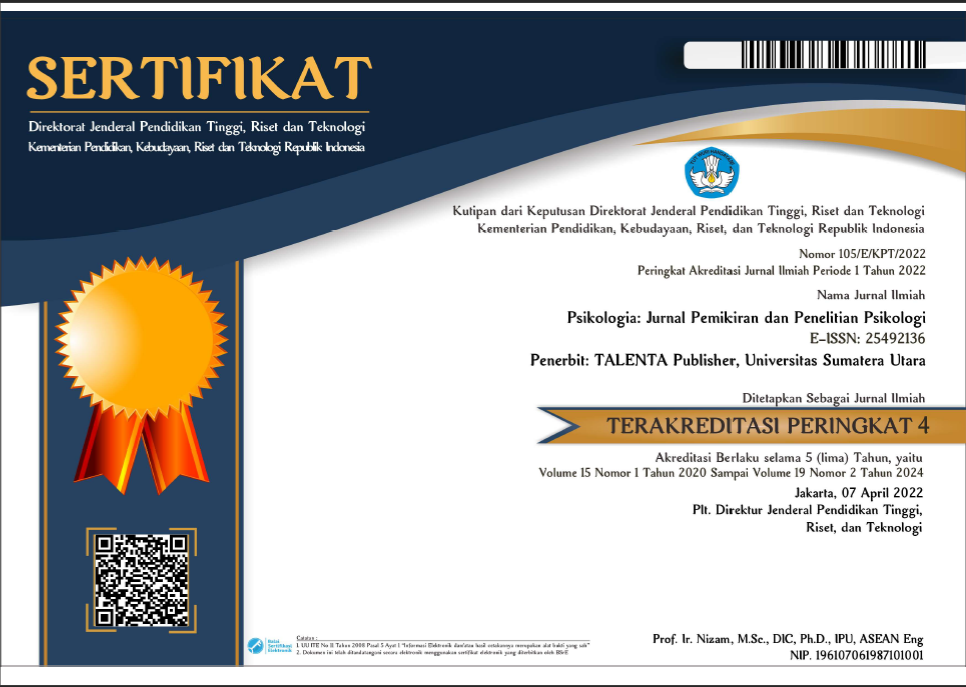Fear of missing out and cyberloafing among college students
Fear of missing out dan cyberloafing pada mahasiswa-mahasiswi
DOI:
https://doi.org/10.32734/psikologia.v15i2.4893Keywords:
fear of missing out, cyberloafing, studentsAbstract
English
This research examines the effects of fear of missing out on cyberloafing. Individuals who experience fear of missing out are afraid to miss a pleasant experience. The individual will try to stay connected with others through social media. The study hypothesized that fear of missing out would be positively related to cyberloafing, which refers to behavior of accessing the internet for non-academic activities. As expected, the results show that fear of missing out accounted for about 22 per cent of the variance of cyberloafing. Those who are more afraid of missing out tended to engage more cyberloafing than those who are less fear of missing out.
Bahasa Indonesia
Penelitian ini menguji efek fear of missing out pada perilaku cyberloafing. Individu yang mengalami fear of missing out takut melewatkan pengalaman yang menyenangkan. Individu akan mencoba untuk tetap terhubung dengan orang lain melalui media sosial. Studi ini berhipotesis bahwa fear of missing out akan berhubungan positif dengan cyberloafing, yang mengacu pada Perilaku mengakses internet untuk kegiatan non-akademik.Seperti yang diharapkan, hasil menunjukkan bahwa fear of missing out menyumbang sekitar 22 persen dari varian cyberloafing. Mereka yang memiliki fear of missing out tinggi cenderung terlibat lebih banyak cyberloafing daripada mereka yang memiliki fear of missing out rendah.
Â
Â
Downloads
References
Akbulut, Y., Dursun, O. O., Donmez, O., dan Sahin, Y. L. (2016). In search of a measure to investigate cyberloafing in educational settings. Computers in Human Behavior, 55, 616–625.
Alt, D. (2015). College students academic motivation, media engagement and fear of missing out. Computers in Human Behavior, 49, 111–119. https://doi.org/10.1016/j.chb.2015.02.057
Arabaci, B. (2017). Investigation faculty of education students cyberloafing behaviors in terms of various variables. Turkish Online Journal of Educational Technology, 16, 72–82.
Azizah, S. N. (2019). Cyberloafing sebagai strategi mengatasi kebosanan kerja. Jurnal Fokus Bisnis, 19, 1–7. https://doi.org/https://doi.org/10.32639/fokusbisnis.v18i1.301
Baturay, M. H., dan Toker, S. (2015). An investigation of the impact of demographics on cyberloafing from an educational setting angle. Computers in Human Behavior, 50, 358–366. https://doi.org/doi.org/10.1016/j.chb.2015.03.0%2081
Blanchard, A. L., dan Henle, C. A. (2008). Correlates of different forms of cyberloafing: The role of norms and external locus of control. Computers in Human Behavior, 24, 1067–1084. https://doi.org/10.1016/j.chb.2007.03.008
Burke, M., Marlow, C., dan Lento, T. (2010). Social network activity and social well-being. Conference on Human Factors in Computing Systems - Proceedings, 3, 1909–1912. https://doi.org/10.1145/1753326.1753613
Junco, R., dan Cotten, S. R. (2012). No A 4 U: The relationship between multitasking and academic performance. Computers dan Education, 59, 505–514. https://doi.org/10.1016/j.compedu.2011.12.023
Karaollan Yilmaz, F. G., Yilmaz, R., Ozturk, H. T., Sezer, B., dan Karademir, T. (2015). Cyberloafing as a barrier to the successful integration of information and communication technologies into teaching and learning environments. Computers in Human Behavior, 45, 290–298. https://doi.org/10.1016/j.chb.2014.12.023
Kraut, R., Kiesler, S., Boneva, B., Cummings, J., Helgeson, V., dan Crawford, A. (2002). Internet paradox revisited. Journal of Social Issues, 58, 49–74. https://doi.org/10.1111/1540-4560.00248
Kross, E., Verduyn, P., Demiralp, E., Park, J., Lee, D. S., Lin, N., . . . Ybarra, O. (2013). Facebookuse predicts decline in subjective well-being in young adults. PLoS ONE, 8, e69841. https://doi.org/10.1371/journal.pone.0069841
Lim, V. K. G., dan Chen, D. J. Q. (2012). Cyberloafing at the workplace: Gain or drain on work?nBehaviour and Information Technology, 31, 343–353.nhttps://doi.org/10.1080/01449290903353054
Ozler, D. R., dan Polat, G. (2012). Cyberloafing phenomenon in organizations: determinants andnimpacts. International Journal of eBusiness and eGovernment Studies, 4, 1–15.
Prasad, S., Lim, V. K. G., dan Chen, D. J. Q. (2010). Self-regulation, individual characteristics andncyberloafing. PACIS 2010 Proceedings, 1641–1648. Retrieved from https://aisel.aisnet.org/pacisn2010/159
Przybylski, A. K., Murayama, K., Dehaan, C. R., dan Gladwell, V. (2013). Motivational, emotional, and behavioral correlates of fear of missing out. Computers in Human Behavior, 29, 1841–1848. https://doi.org/10.1016/j.chb.2013.02.014
Ravizza, S. M., Hambrick, D. Z., dan Fenn, K. M. (2014). Non-academic internet use in the classroom is negatively related to classroom learning regardless of intellectual ability. Computers and Education, 78, 109–114. https://doi.org/10.1016/j.compedu.2014.05.007
Reagle, J. (2015). Following the Joneses: FOMO and conspicuous sociality. First Monday, 20, 1—–8. https://doi.org/10.5210/fm.v20i10.6064
Zahra, N. (2019). Hubungan intensitas penggunaan media sosial dengan fear of missing out pada mahasiswa. Retrieved from http://repositori.usu.ac.id/bitstream/handle/123456789/25477/151301 028.pdf?sequence=1&isAllowed=y
Downloads
Published
How to Cite
Issue
Section
License
Copyright (c) 2021 Psikologia: Jurnal Pemikiran dan Penelitian Psikologi

This work is licensed under a Creative Commons Attribution-ShareAlike 4.0 International License.








